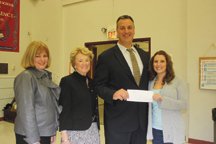Two Bayonne teachers have been awarded grants from Public Service Gas & Electric to continue their environmentally progressive class work.
Richard Dwyer, public relations person for PSE&G said among the winners of the PSEG 2010 – 2011 Environmental Education Grant Program are two Bayonne educators. Barbara DeBenedictis, a teacher at Oresko School received $2,500 to continue work on a “Rock N’ Renew Community Garden,” and Marissa Pacilio of Mary J. Donohoe School received $3,165 to establish an outdoor classroom.
This is the 20th year PSE&G has offered these grants, which are open to educators of grades kindergarten to nine, and helps to inspire teachers to implement an interdisciplinary approach to teaching about the environment.
For DeBenedictis, this is the fourth time that she has received this statewide award.
“This is an honor and wonderful, for teachers and students.” – Barbara DeBenedictis
________
Developed in partnership with the New Jersey Business/Industry/Science Education Consortium (NJ BISEC) and the Alliance for New Jersey Environmental Education (ANJEE), the program has awarded 143 projects statewide since 1991, distributing more than $335,000.
Grants are available to teachers who can successfully link their students’ understanding of science, mathematics, computer science, and/or technology concepts with an enthusiasm and appreciation for the environment. Funds may be applied to equipment, materials, and field trips that would not normally be provided by the school or school district.
Schools Superintendent Dr. Patricia McGeehan said PSE&G is helping the school district accomplish great goals, part of a district effort for Bayonne schools to “become green.”
A garden in an urban setting
Called the “Rock N’ Renew Community Garden” project, the garden is in a formerly empty lot two blocks from Oresko School.
DeBenedictis’ students have been working on the garden since April. They have helped in planting beds, planted seeds and seedlings, maintained the compost pile, weeded, watered, and more.
The new “green space” will become a community vegetable garden, as well as an education and cultural center, using art and music to generate excitement about green solutions.
Last year, thanks to the cooperative effort between John Dubowsky and DeBenedictis, the urban garden on 22nd Street grew more than 42 different kinds of vegetables.
“And this is in Hudson County,” said Dr. McGeehan.
The grant, DeBenedictis said, would be used to help to take the project to a regional and global level to have students communicate, share data, and experiences with students working on similar projects in New York City and Hawaii.
According to the application for the grant, “Students will demonstrate awareness of the need to reduce, reuse and recycle; learn the small and simple actions that anyone can do to fix/heal the planet; learn about and practice several composting techniques; learn about and demonstrate organic gardening and permaculture; prepare presentations about their gardening work and share info by ‘teaching’ other students; and reduce the amount of landfill trash from the school’s lunch program.”
“This is an honor and wonderful, for teachers and students,” DeBenedictis said. “This is a big deal. Because now we will be able to get some resources and really get some great things done. It was done by seventh and eighth graders last year. A lot of people don’t know about it. But once we get this garden going, we’ll be inviting everybody to come see the garden and help plant and learn about the environment. It’s a wonderful program, and PSE&G has done a wonderful thing in helping us put this project together.”
A place to study birds and plants
Pacilio, who teaches math and science at Mary J. Donohoe School, said she got involved with environmental projects through the district’s Cleaner and Greener program. She said that an outdoor classroom, located somewhere on the school grounds, would provide a place for students to study nature from the ground up.
“This could include watching birds or raising plants,” she said.
According to the school’s application, “The Project goal is to teach students about the interdependence of the environment and people, to encourage community involvement, and to foster responsibility and respect for nature in an urban setting.”
Students will visit a local nursery to learn about perennials, annuals, soil, planting and feeding of plant life; maintain plant life and perform general maintenance; observe changes in the garden as well as observe bird and animal life that visit; build the outdoor classroom with community volunteers, beginning with the installation of safe ground cover and chain link fencing; keep a journal to document their visits; write stories based on their experiences and have selections posted to school’s Web site; record growth patters and monitor temperature changes; chart garden maintenance responsibilities, evaluation weather, light and temp effects on plant life; compare garden to their domestic surroundings; visit other urban gardens to improve their own garden; observe and document the characteristics of their community and others like it; reach out to the community for support; draw, sketch, and paint landscape artwork of the garden.
Pacilio said she won’t be waiting until spring to start, but will begin as soon as the school receives the money to make plans, looking up different types of plants on the Internet as to what kind to put here.
“Students will keep journals and keep track of their findings,” she said.
Al Sullivan may be reached at asullivan@hudsonreporter.com.
